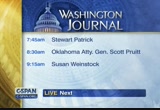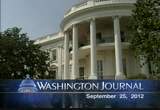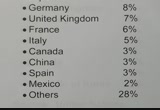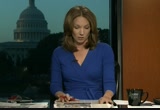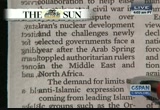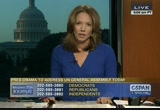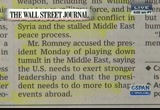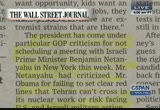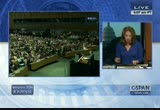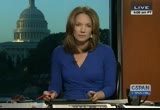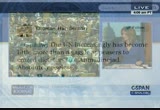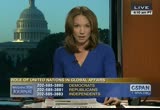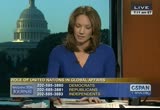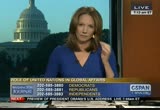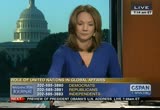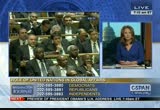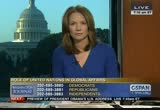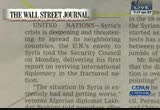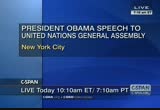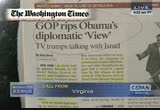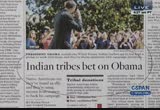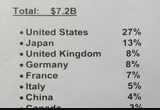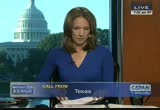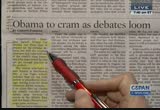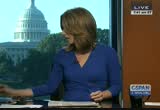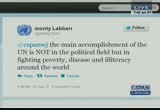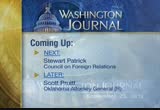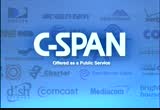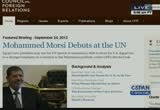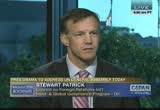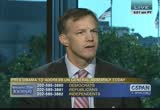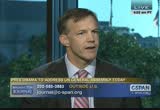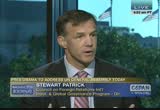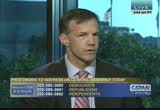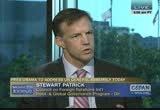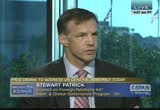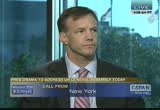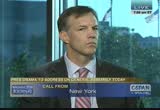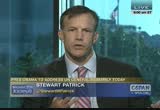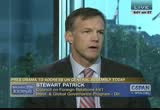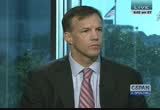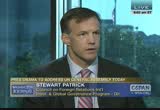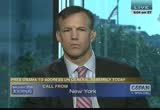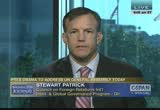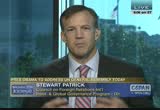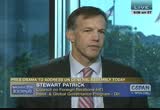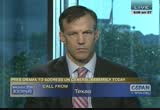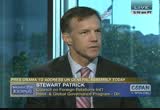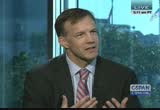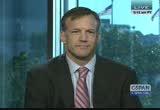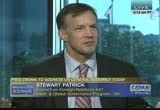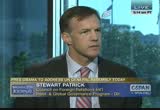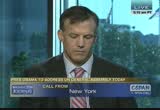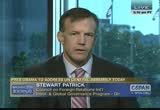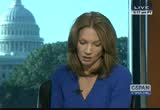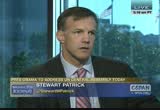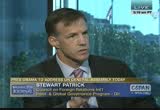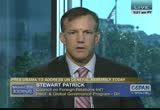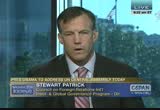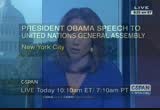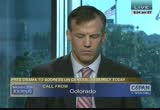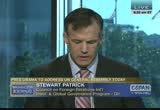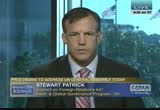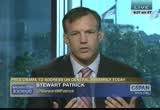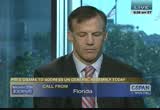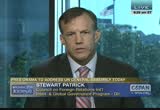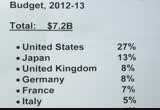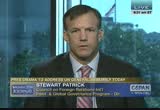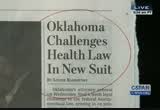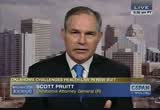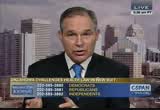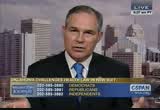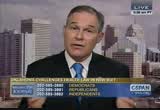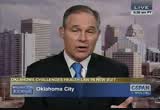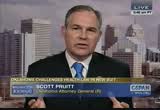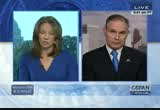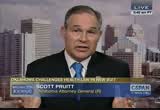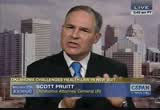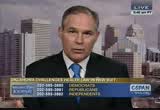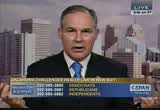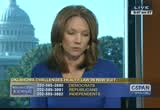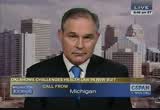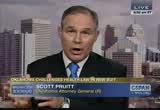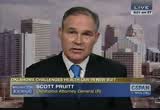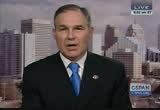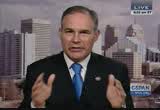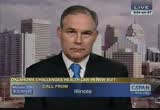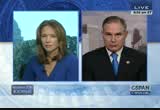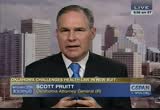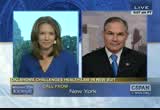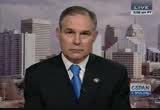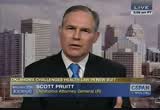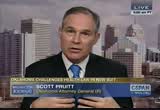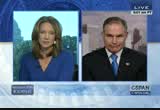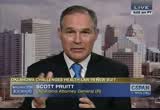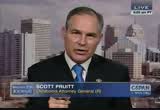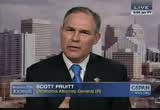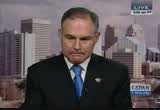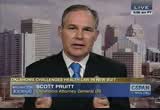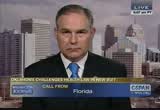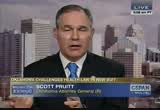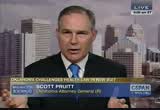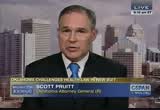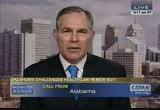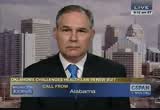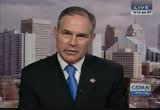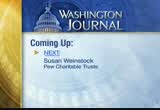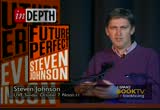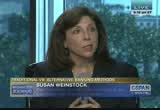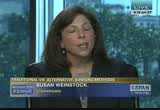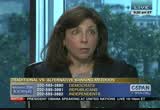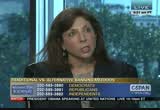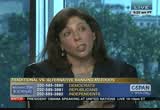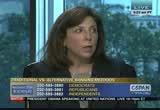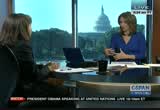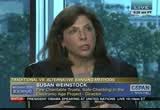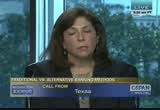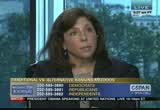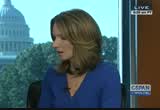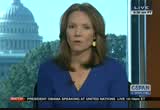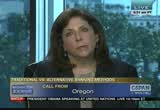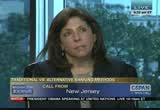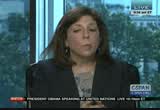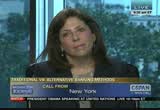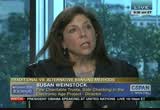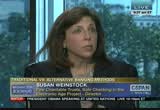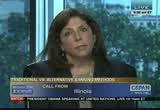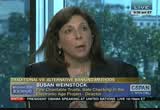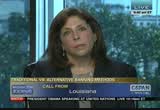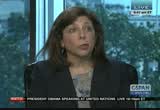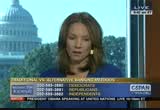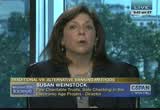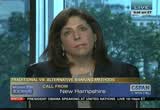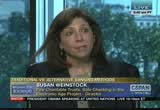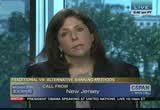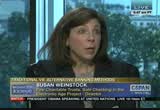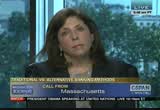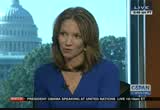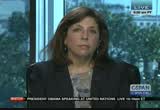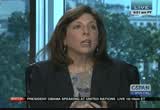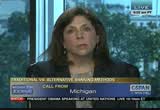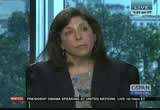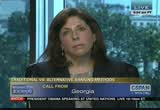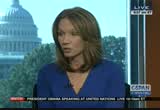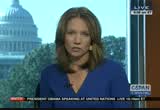tv Washington Journal CSPAN September 25, 2012 7:00am-10:00am EDT
7:00 am
" washington journal" with the dates headlines in phone calls. we will talk to store patrick from the foreign on council relations for a preview of the president's speech. we will talk to the local -- oklahoma attorney general on the new health-care law. also, susan humber weinstock on her study of finding prepaid debit cards often come with him in peace. -- hidden fees. host: good morning on this tuesday, september 25. president obama delivers his fourth address to the united nations in new york today. topics include libya, iran, syria, and north korea. he will have remarks around noon eastern at the clinton global initiative. republican candidate mitt romney
7:01 am
will speak first at the event, 9:00 a.m. this morning, live coverage on c-span 2. in the papers, all eyes focused on new york for the united nations gathering. we want to get your take on the united nations and global affairs. you can also send us a tweet. post your comments on facebook. or email us. let's start with the money. the united nations budget for its operations for 2012/2013. the breakdown like this --
7:02 am
7:04 am
we want to get your take this morning on the role of the un in global affairs. patrick is first in carnegie, pennsylvania, a democrat. good morning. caller: good morning. i think the role of the un has become bastardized because of the state of israel. all you have to do is go to the mideast section of the u.s. state department and you see and
7:05 am
7:07 am
and here's the picture inside the new york post of the president and michelle obama meeting with the latest from the view. jim in pittsburgh, pennsylvania, the republican line. caller: i think every free country should get out of the united nations. itthe muslims are not going to t along with anyone, so why try to pacify them? england, the united states, get out of the united nations. i'm tired of hearing hate speeches from people from other countries condemning us. this is a united nations of hate. host: if you go to the united
7:08 am
7:09 am
i think the muslims are a big problem with the united nations right now and we should stop trying to pacify them. we have a wenow who seems to sit there and watched-- we have a president now who seems to sit there and watch it. all he has been doing is apologizing. they killed two of our soldiers in afghanistan and the apologized to them. when the embassy was attacked, it was the man who had the movie's iffault. these people hate us. host: here is this on twitter --
7:10 am
7:11 am
something supported by the united states either. this year requesting an upgrade in its status but not full membership. we are taking your questions and comments on this at, this morning. the role of the united nations in world affairs. president obama will give his speech to the general assembly today in new york. that coverage begins around 10:00 in the morning. you can watch c-span to hear the president's remarks. mitt romney will be speaking around 9:00 a.m. this morning. we will have coverage of that on c-span 2. in other headlines this morning, here's the washington post --
7:12 am
7:13 am
7:14 am
people because they don't know how we did or business affected them and created the situation we are in now. the hate is not out of the blue. host: what does that mean for the role of the united nations? caller: it was to create peace, for people to actually talk. we could watch it happen. everything cannot be perfect. just to disband it is ridiculous. host: you point to some success of the united nations when it comes to peacekeeping? caller: plenty of successes, but i don't have time to answer. host: but you think there have been successes in the past? caller: of course.
7:15 am
whenever you can talk and reason, there's hope for peaceful solution for almost anything. we probably have avoided many hardships in the world by having the un. host: john, spring, texas, a republican at. caller: i think it would be crazy to eliminate the un. it tends to do a lot more good. i think our main problem is israel has 400 nuclear devices and the most advanced f-16's. that the major problem with the world. host: springfield gardens, ronald, and independents.
7:16 am
-- an independent. caller: when the man said americans don't know history, he stole my fire. if they knew the history of iran, then maybe they would not be so fast to condemn them as being terrorists or whatever. it is important that people find out what happened and not just go by news pundits, because a lot of times they disregard history. as far as the u.n. is concerned, it is a good thing. t is just that they don't convene enough. bacon not convene another because they don't have the political backing to prevent the very powerful nations doing what they want to.
7:17 am
so i'm not sure how great its doing. it's doing good on a peacekeeping side but on the prevention side needs a lot of help. host: what did you make of the u.n. efforts to try to go into syria earlier this year, to have a special envoy there to negotiate peace? caller: regarding syria, that is a hard nut to crack because i don't know enough about it from independent sources. i just cannot go by the current media, because a lot of times they seem to be biased on the u.s. side. host: here's the wall street journal this morning --
7:18 am
7:19 am
around 10:00 a.m. eastern. springfield gardens, independent, ronald, good morning. caller: let me make a short comment. t of this type of reporting in the newspaper. the problem is, without some kind of statement from the average percent -- andit would be hard to figure out, but from an average person from both sides, to understand what's going on. basically, we only get one side , for what i can see. thank you. host: how word in new jersey, democratic caller. caller: good morning. thanks for c-span. in reference to the previous
7:20 am
person who said they hate us, that terminology being used, the general population's don't have hate for america. there are extremist groups who have done terrible things to america. i don't think the people of any country in the world that the majority of the people majorityus. host: what does that mean for the role of the un? caller: the role of the un has been diminished, unfortunately. that is unfortunate, because it was one of the greatest things ever created. every country getting together under one roof to discuss the pros and cons it and have their own input as to what they feel about different things taking place in their country and here in the united states and throughout the world. unfortunately, it has been compromised. . it's .
7:21 am
the powerful countries impose their ideas and the smaller countries don't really have ban adequate say so. what they do say it does not get sufficient consideration. host: do you think the more money you put into the organization, the more sway you have? caller: yes ma'am. the world is in turmoil and a powerful people are calling the shots other than everyone in the world having a say so. and what they have to say to be listened to. not necessarily that everyone would have to do what they say or what they want them to do, but just listen to them, hear what they have to say and give serious consideration to what they feel. it's really time.
7:22 am
i am in my senior years. it is really sad it what i have seen. host: more on syria from the new york times front page this morning -- bets another dynamic coming out of syria. and in "usa today" there is this headline -- clifford, new jersey, a republican, susan. good morning. caller: i am offended that they are letting ahmadinejad speech tomorrow on the holiest day of the jewish calendar.
7:23 am
host: i think he spoke yesterday. caller: i did not call yesterday. host: no, ahmadinejad. caller: i understand he is also speaking tomorrow. that is quite insensitive on the jewish holy days. mr. obama had time to go on "the view," but did not have time to talk to benjamin netanyahu. it does not surprise me. he is very pro-muslim. host: this is the front page of the new york times -- -- "washin- alexandria, virginia, tim, independent. caller: the united nations is
7:24 am
limited, especially with regard to syria, because of russia and china, not a lot we can do. we talk a lot about the iranian nuclear missile threat, but israel has a nuclear arsenal. the u.s. military is prepared to t preparedhe iranian -- is prepared to eliminate the iranian nuclear threat within about two weeks. i don't think it would take them more than a month to finish that off. i really appreciate washington journal and i love your objectivity. what i like the most is when people call, it really makes me believe we need to have a government representative rather
7:25 am
7:26 am
good morning. caller: thanks for taking my call. good morning. the u.n. was created, basically, to undermine the united states. they tried at first with the league of nations. people in our government back then would not accept it. so then they came back with fdr with the united nations. he was progressive and he jumped right into it. if you just look, nobody in the un is our friend, hardly anybody. it was basically created to undermine the united states. host: what about japan, the united kingdom, france, spain, mexico? caller: i think mexico was
7:27 am
complicity with the gunrunning thing and mexico is not really our friend at. japan, i don't know. but for the most part, everything out that the united states wants to do usually gets voted down by china and russia, who are also on the security council. host: this on twitter -- los angeles times -- below that is another political story. indian tribes betting on obama.
7:28 am
we will go to steven in michigan, democratic caller. you are on the air. caller: how are you? thanks for c-span. the united nations, i believe that we pay for most of that. it is a shame that a couple countries can just like everything that's coming down the pike. we are all in this world together and we better learn to live together and share their resources. people are just dying every day. i think the cost that we paid is
7:29 am
the fact that we cannot go around the world trying to be the policeman for every country under the sun. as far as i'm concerned, who cares what iran gets. if they get a nuclear missile, who are they going to kill, the israelis, their neighbors? it is a never ending more over there. those people are living 3000 years in the past. -- it is a never-ending war over there. it is the ones who rule their countries that during all this about. if we did not have the united nations to deal with it, we would have our armies on every land around the country. host: ann independent caller, heather, pennsylvania. caller: thanks for taking my call. i believe the united nations is just in place to -- i don't know
7:30 am
how to word it -- it is there to control what goes on in the world, but i don't believe it helps anything. i never saw the numbers you put up this morning. we are paying for most of it and we wonder why we are in debt. i don't understand that. host: here are the numbers. the operational budget -- they also have a separate budget for peacekeeping. and we can show you the percentage the u.s. pays for the peacekeeping budget as well as the other member countries. 193 nations belonging to the
7:31 am
united nations. president obama's speaks today at 10:00 eastern. mitt romney gives his speech to the clinton global initiative around 9:00 a.m. eastern time. president obama will also go to the global initiative to give a speech around noontime eastern. we will move on to richard in lake placid, florida, an independent. what are your thoughts on the u.n. and its role in global affairs? caller: good morning, greta. we should probably get out of the un. alba socialists and global domination folks went to the un after the soviet union was dissolved. -- all the socialists and global domination people.
7:32 am
their latest thing is agenda 21. if you want to get nervous about something, look that up on the un. it's about controlling resources, global resources such as energy, food, water, and to eventually deny the people private ownership of property. it is being implemented all over the world. host: back to twitter -- richmond, virginia, republican line,. caller: i think that ahmadinejad should not be in the united states on the holiest day of the year.
7:33 am
i concur with ron paul. -i -- we have done enough. we should stop. host: how old are you? caller: 18. host: closely following all the foreign policy issues? caller: yes. i plan to vote for mitt romney. host: because of foreign policy issues or economic/domestic issues? caller: both. host: now to a democratic caller in pennsylvania, don. caller: the u.n. has failed is rail many times. one time when egypt threatened to close the strait and the war against the egyptians started. they failed israel miserably
7:34 am
in the north at the southern part of a non. southern part of lebanon. they promised that has a law would not be allowed to re-arm. -- hezbollah would not be allowed to re-arm. on august 10 of 2012 in the inquiry there was an article called "terrorism and palestinian statehood," . read.people should " hos and this on twitter --
7:35 am
the washington times has this headline -- calling for the policy makers in the united states to put the fiscal cliff ahead of politics. in texas, a democratic caller, henry. caller: good morning. romney is about a year-and-a- half older than i am. i remember in the 1960's they were drafting everybody like crazy. from what i've understand, he went on the religious sabbatical and took a religious draft exemption. back then that was a
7:36 am
conscientious objector status in the 1960's when they were drafting everybody to go to vietnam. that was before the lottery system. it was basically the old system. i feel like to the core of romney, he is two-faced. host: what does this have to do with the role of the united nations? caller: if he does not have the guts to stand up for this country, what makes you think he would be suitable to be president of the united states? host: here's thomas on the line. caller: i think the u.n. is doing a decent job. it is an enormous task they are undertaking. the bigger problem is our relationship with israel. we let them dictate to us on everything.
7:37 am
the republicans are lining because obama will not meet with benjamin netanyahu. benjamin netanyahu got 42% of the vote in the last election in israel. most israelis don't want him. he's a warmonger who wants to get us involved in a war with iran if we don't wake up. host: this call from massachusetts. caller: thanks for taking my call. my comment is almost the same as the previous caller about benjamin netanyahu. president obama on "60 minutes" pressure.'s no
7:38 am
he said that he would block it out when he makes decisions for the united states. that's the wrong answer. think the prime minister should be pressuring the president of the united states. host: what does this mean for the united nations? caller: i like the u.n. any time people come together and thought, it's reasonably good. but it needs to be updated for the new powers and it ne conew countries. the security members have a veto. people need to be explained why
7:39 am
those five countries and why not other countries? host: on twitter -- albany, new york, democratic caller timothy. caller: the role of the un is to be a platform for discussion at hand for diplomatic relations between all the countries in the world. host: is it serving that purpose? caller: i think it is, but their expectations are too high. it's not going to solve our problem. we will not be able to use it for something it was never intended for. people seem to get upset because they think that because the u.n. issues sanctions against a country or takes action against a country and that country refuses to cooperate, then they feel the
7:40 am
u.n. is parlous. but that's not the case. host: about the budget numbers that we showed, that was a decrease. the 2012-2013 budget is leaner than in past times. here's a story written in december by reuters. that was in december of 2011 when they passed their 2012-2013 budget. back to politics this morning. here is the baltimore sun --
7:41 am
7:42 am
freddie is a democratic caller in lanham, maryland. caller: thank you very much, c- span. the un is a very good entity. but the main problem is the united states and israel. israel is the biggest stone in the shoes of the united states. the president of the united rael.s not bowing to is mitt romney wants to start another war with iran. host: this on twitter --
7:43 am
the president will be giving his address to the united nations this morning around 10:00 a.m. eastern time. look for coverage on c-span. governor mitt romney will be at the clinton global initiative this morning giving a talk about foreign affairs at 9:00 a.m. eastern time. look for our coverage on c-span 2. president obama will travel over to the clinton global initiative to give his speech around noon eastern time. go to c-span.org for details of coverage of those events in new york. let's go to new york state, democratic caller, david. caller: good morning. i understand that the united nations has not been able to put together a peace plan for its
7:44 am
and for israel palestine. palestine is not really a country because it does not have defined borders. israel does have defined borders and has received missile attacks. ahmadinejad has said terrible things about president bush and about is rael. this nation has not backed away from israel, but this president does not seem to want to meet with him.
7:45 am
the u.n. does have power and a military force, but they are not exercising it. host: you think on the mideast peace process, that the u.n. has failed at? caller: absolutely. not only has it failed, but the people in the middle east want freedom of speech. the internet is available to them. if they can see youtube in the middle east and watch videos and they get upset at what they see and they come with rocket- propelled grenades to protest, there's something wrong. the united nations has failed them. their own government has failed them. we have failed them. host: the conversation continues. we will preview president obama's speech to the united nations today with our guest stewart patrick up next. and later, oklahoma attorney general scott pruitt will discuss the state posing new legal challenge to the
7:46 am
president's health care law. we will be right back. new legals challenge to the health care law. [video clip] >> any time something is going on, i want to watch c-span, because they typically have the best, most unbiased view of whatever is happening. i love c-span. i want them on tv or on line. if something's going on and i want to know what's happening, i always go to c-span. i don't know that i have a favorite show. anytime i need to know what's going on, i know that c-span will have the real story. >> josh watches on directv. c-span, created by america's cable companies in 1979, brought to you as a public service by your television provider.
7:47 am
>> we underestimate how much we forget of our own ideas and of the things we read. we are just terrible. even those of us with good memories typically forget, especially if an idea is just a fragment, excluding sense of something is interesting and then it disappears. one of the things i found a lot of people do and i tried to do as well is not just to write everything down but to keep everything tied together. don't overorganize your notes off in folders, because you want interesting collisions happen between your ideas. the important thing is to go back and reread your notes from six years ago and to revisit your past self and the ideas you had. that's what was common among all the great ideas of the
7:48 am
enlightenment. they would put together passages from things they were inspired by and they would write their own notes and then would go back and read this book, which was a sample of all their ideas. their intellectual self was formed by this constantre imaginings of other people's ideas. >> steven johnson will be our guest next month. he will look at the cyberworld, popular culture, and computer networking, and politics. sunday, october 7, on c-span 2. >> "washington journal" continues. host: we welcome stewart patrick, the director of the international institutions and global governance program at the council on foreign relations, to preview president obama's
7:49 am
address and tell us what is on the agenda for the u.n. general assembly. it started last week, but the leaders kick off their speeches today. what do you expect? guest: this is a town hall meeting of the world which happens once a year when world leaders gathered to kick off the annual general assembly. in this session, the middle east will be front and center. i expect in many of the speeches they will deal with the ongoing slaughter occuring in syria, the major challenges posed by iran and its nuclear weapons program, and the turbulence that has been created by the riots throughout the moslem world, all of which have thrown the region into turmoil. host: there are several lines in the papers today on the riots. some of the muslim countries are asking for sanctions on speech,
7:50 am
on anti-islamic speech. how would that be written and what's the possibility? guest: i think it would like you and general assembly resolution condemning that type of speech and calling for a condemnation of anti-islamism. the difficulty with that is that within the u.s. political system and throughout the western countries who believe in democracy and human rights, that really goes against freedom of speech that we hold dear. the anti-defamation effort has been a big one within the muslim world. the turks among others have been leading that for quite some time. the united states has blocked that because they believe it could be a stalking horse for cutting down on free speech within these countries and for religious discrimination.
7:51 am
it's very hard to define defamation of religion. so the president in his speech will have to condemn the video that makes fun of the prophet muhammad without at the same time apologizing for the for amendment. host: it's not just the turkish president asking for this. it's also the new egyptian president mohamed morsi who will be calling for this. what do you make of that, given the protests in cairo recently and president obama's relationship with this new president? guest: all the leaders coming, including mohamed morsi, are playing a double game. applying a domestic game and an international game. he is the head of an islamist government, not a jihadist government, but an islamist government led by the muslim brotherhood. he must condemn this and call for international action. at the same time, people in the u.s. are very wary about whether or not he will communicate a
7:52 am
style of governance that is zero more in the turkish style where there's a big religious influence within the government but there will also be tolerance for pluralism. i expect he will call for this, but i assume there will be very much on the part of the u.s. and other countries,articularly the western countries, a lot happening in the back rooms to try to stamp this down. it would be disastrous for this to move into a situation. he has already indicated in his interviews that he is going to try to have a new relationship between the united states and egypt. for so long the u.s. supported a strong man. egypt remains strongly dependent on u.s. foreign assistance. so he has to be aware of going
7:53 am
too far in the direction of affiliating the u.s. and must make a guarantee that the status quo with a state of israel will continue. -- so he has to be aware of going too far in the direction of alienating the united states. palestine is looking for non- member observer status, which would be significant. it does not require a vote in the security council. last year the u.s. engineered a rebuff of that effort. but it would allow the palestinians to have a seat in many of the u.n. specialized agencies. to beyear they made a bid fo a member of unesco. they could join the international atomic energy agency or the world health
7:54 am
organization. the united states would then be forced to defund those agencies, forcing the u.s. to cut off its nose to spite its face. if mahmoud abbas wants this, he can get it, because he only needs 50% of the un general assembly. the indications are he will try to hold off any moves in this direction until after the presidential elections. otherwise it would put tremendous pressure on president obama. host: so there will not be a vote. guest: not until after the presidential elections, presumably. host: some things folks might not know will happen on the agenda. guest: >> the question of syria and what can be done. there's very little prospect for. any for. given the chinese and russian
7:55 am
positions and three in double vetoes on this issue there's not going to be any movement on syria. in the development field and aviation, there's an effort to try to come up with the replacement or successor to the millennium development goals, which has helped fight global poverty and helped china and india bring hundreds of millions of people out of poverty in recent years. those are set to expire in 2015. the question is what comes next. a lot of people building on the rio summit say we need sustainable goals that merged party mediation with sustainability. to have growth but not kill the planet at the same time. host: a vote is expected on
7:56 am
that? guest: it's not a vote, but trying to define a new development agenda for the united nations. host: are talking more money from the country's? guest: it could be more money, but it could be the embracing of a number of new principles and how to go about development. it could lead to things like recommendations for greater investment in clean technology or taking account the environmental services that we don't tend to put a price on that nature provides for us and allows us to have clean air, but allows us to have clean water. host: 70 on twitter - -- cindy -- guest: i believe the vice president will be in there from assad.buct not push our
7:57 am
neither the international community is united nor are there many prospects on the ground in syria right now for a solid resolution to the crisis. brahimi delivered a report to the security council yesterday that he suggested there might be openings in the future but the overall prognosis is pretty downbeat. there's already been 25,000 people killed. the situation is disastrous. up to a 2 million people displaced and hundreds of thousands of refugees on the border. host: this story in the new york times -- what do you think the countries will be talking about on that front? guest: there will be some effort on the part of the united states and the iraqi government to try to see if they can contain backpack.
7:58 am
when you have fragile states, they have very poor border control. there are also minorities, including kurds in syria as there are in iraq and iran and turkey, you have a potential situation where you get increased cross water flows of militant groups seeking to have some changes on the borders as well. the last thing the united states wants is for syria to stabilize itself and to destabilize a country that we helped at such great expense in american lives and treasure to put back together after the fall of sadaam hussein. host: call is on the phone on the democratic line. caller: i am surprised at the number of americans and the number of c-span viewers who are not supporters of the united
7:59 am
nations. i'm a big supporter. i would like to give an example. the united nations charter and the provisions that could have stopped hitler and world war ii and if we had the united nations in the 1930's. when hitler and his troops marched back into the rhineland, the united nations security council could have applied economic sanctions which would have stopped sweden from selling iron ore to germany. it would have stopped romania from selling oil to hitler. without those, hitler never would have been able to re-arm and conduct his other war motions. i'm a huge believer that it literally could have stopped hitler if we had it back then
8:00 am
and apply the provisions and the other members of united nations respected the sanctions of the united nations. host: mr. patrick. guest: thanks very much. there's no question the united nations has greater tools at its disposal than its predecessor, the league of nations, which was created in the aftermath of the first world war. that being said, the key in the scenario you laid out was the willingness of the major powers to actually use the tools at their disposal. what we saw in the 1930's is well league of nations, in spite of having some of the most powerful countries including britain, italy, france, etcetera, they declined to actually use the powers of the league of nations -- for instance, during the invasion of ethiopia or the spanish civil
8:01 am
war. just looking back historically it often depends on the will of the parties. what you have here today is the situation in syria where -- and syria is a type of example -- if you don't have agreement among the permanent five members of the security council who, when the agree, are truly all powerful, if you don't have agreement -- with china and russia cast in double vetos three times -- you really can't have an effective united nations is your counsel for international security. but i agree with the general progression we would have been in better shape in the 1930's with the u.n.. >host: a viewer on twitter writes -- talk more about china and russia. guest: there is a structural flaw. it is a flawed but it is the price of the united nations. the united nations was set up with, in a sense, all powerful
8:02 am
security council and particularly the permanent members. and the price for membership for permanent membership -- excuse me, the price for the united states, russia, and the soviet union, france, china, the united kingdom for setting up the united nations was to demand a veto within the u.n. security council. . that means if they fell the core interests were at stake they could veto enforcement action. that is what is happening in the case of syria. only naval base in the mediterranean is in syria. it has a longstanding relationship, including an arms relationship. it is russia's told, in a sense, in the middle east. it is not inclined to endorse what it considers a very one- sided relations. host: before you go to china -- is this the equivalent of us
8:03 am
wanting missile defense in poland or having something in another country? guest: i think it is partly the russians do not want to lose their influence and want to be a global player. the other big thing for russia and china, probably the bigger thing, is neither is interested in really promulgating the principle that the international community to -- should have the right to intervene in situations of gross human rights abuses. they agreed to abstain in the case of libya but then they saw and their own mind the western powers take the resolution to protect civilians and turn it in their view for a license for regime change. weather and not gaddafi had been deposed and not, i did not think it would be enthusiastic about a similar intervention in syria because they feel themselves internally vulnerable. they have quite poor human- rights record and there have
8:04 am
been times where they have oppressed minorities and other groups in their own country. host: death is an independent in new york. -- beth is an independent in new york. caller: i would like to ask mr. pass a question. it has to do with the end of the u.n. why haven't the different countries that the united states had been giving money to dictatorships for so many years, and people ask questions why they hate us, and the fact that we were giving money to the dictators to suppress the people. and now that they are throwing out these dictatorships, why hasn't the united nations said to the united states, you did this, you gave them the money, you promoted them, they suppressed their people and now that the people want to be free and have democracy, why isn't the u.n. saying to the united
8:05 am
states, you did this to yourself? host: are you referring to the arab spring? caller: yes, to syria and egypt and other countries, pakistan -- a lot were dictatorships. even hussain in iraq, we gave him money over the years and a suppressed their people. and we supported them. and then the people turn around and say that they hate the people in the united states. you kind of not blame them. guest: i think you raise a point that i think both towards the end of the last of ministration, the administration of george w. bush, and also president obama's cairo speech, major u.s. officials have acknowledged -- condi rice as a secretary of
8:06 am
state gave it a promise beach that the nine states had supported authoritarian regimes and it ultimately would be on the wrong side of history and time for a breath of fresh air and the democratic revolution to move to the muslim world. president obama's speech in cairo early in his presidency attempted to do the same thing and breed some sense of liberalism into the muslim world. the difficulty, as you point out, is memories are long and people remember that for a long time in the interest of stability during the cold war, the authoritarian dictator maybe an sob but he is our s.o.b. -- and even after the cold war when it came to some arab regimes, we were willing to purchase strongmen who would at least have a reasonable relationship with israel. we can't be surprised, as you point out, that when these
8:07 am
democratic openings occur, some of the people owe were most mobilize are those who worked in a sense outlawed as political parties, and in many cases they are islamic parties and not pro- american. i think the united states -- it was a little slow off the ball in terms of endorsing the arab spring, particularly in the case of egypt, but the united states has tried to give it. last year, president obama came to the united nations and was really ou -- touting these liberalizing movements but in the last years with the recent riots and anti-americanism we found we open a pandora's box. in some cases, things are going to go down the direction that, if not secular, pluralist -- and in other cases things may get quite dicey and we may be confronted with a democratically elected governments even that are not necessarily on the same page as we are into the fundamental values and
8:08 am
interests. host: "the washington post" editorial notes there has been pro-american push back in libya and egypt. a revealing reaction, they say, against attacks on u.s. missions. people with pro-america signs pushed their way into an encampment -- guest: this is a very hopeful development and also suggest what you see on a particular day on the so-called arab street is not necessarily a reflection of the more silent majority or in some cases less silent. people coming out afterwards and decrying the violence. in libya clearly many people remain extraordinarily grateful for the u.s. and western and you and assistance in helping rid them of muammar gaddafi.
8:09 am
and i think that is a hopeful sign. host: texas. gary is joining us on the republican line. caller: yes, ma'am. yes. i am just trying to figure out what is going on in america. host: you got to turn your television down. just go ahead and give us your question or comment. it caller: i am just trying to figure out what is going on in america. we had a president, a u.n. ambassador drug through the streets in libya and he is at a fund-raiser in las vegas? come on. the american people need to wake up and see what is going on with barack obama. mr. obama has not done nothing good for this country, he is not a leader, and people need to realize. i was a democrat up until this year and as i saw hillary clinton and he went on television with $70 million of
8:10 am
our tax dollars to show an ad over there, apologizing -- what do we have to apologize to them people for? they told us. we did not kill them. host: travel let gary's comment stand. "the new york times" has a big piece about president obama's diplomatic strategy. with in it, and lack of chemistry. -- a lack of chemistry. how important is it, and why would an arab diplomat said he does not pat you on the back? why is that important? guest: an interesting comment. fascinating one. could probably testify to cultural differences in terms of
8:11 am
the way one goes about business in different parts of the world. and it is also sort of amusing when you reflect on george w. bush, of course, the was famous for giving everyone nicknames but had also some misadventures in the middle east as well. but in this case, i think the president's aloofness is not standing him in good stead. personal relationships and trust are extremely important in the muslim world, particularly the arab world. the touching of hands, the sort of repeated, often very slow interaction of negotiation, of getting to know and establishing trust. from a cultural perspective, often standing so close that you can smell each other is a breath is sort of an indication of personal intimacy and trust in a way. and i think the president's natural reserve, his salary broad nature, is probably --
8:12 am
cerebral nature is probably not as conducive as it might be in terms of building new relationships of trust particularly in a very changing and the fluid environment. an interesting question of personal style. host: is it something state department officials advise a president on? this is what you need to do when you are talking to an arab leader, this is what you should not do, etc.? guest: very much so. i think the foreign service officer corps -- which i was not a foreign service officer -- is really inculcated when they go out to missions to the particular country. but certainly any president should be well briefed, and would be expected to be well briefed about particular customs that are certainly anathema but also those which are icebreakers that can really help make a difference. host: oregon. democratic caller. chalk is joining us.
8:13 am
caller: good morning. i just wanted to make a quick comment about how offensive it is for me that other people would kill someone because they are offended from what someone else might do. i don't know if those people don't understand -- that this is a democracy we live in. all that means is wednesday of no. you they will do whatever they want to you. that is what they think. you guys know that. so, anyway. it is not going to be good. host: why are we pushing democracy around the world? guest: all over the long term -- and maybe even in the medium term, the notion is -- or the reality is democracies, once they become consolidated, and that not only delivering fundamentals human-rights to people that we believe our universal and terms of freedom of assembly, freedom of speech, freedom of conscience, freedom
8:14 am
to do your own thing, freedom to be left alone to some degree by your government and not interfered with. but democracies also tend to promote other aspects of freedom, including economic freedom. they also tend to be more peaceful with one another. all things being equal, they can be messy but it is the best form of government, and we believe -- speaking for myself, here -- i think the united states probably have -- has a bipartisan perspective that democracy is something all peoples which is it the had the opportunity. that being said, there are different versions of democracy. social democracy, islamic democracies. and the question is really how do you go about promoting it. we have seen problems of attempting to promote it at the barrel of a gun. but we have also seen that there are ways of promoting it through the building up of civil society, aid to alternative
8:15 am
political parties and different countries, etc.. and i think that trying to do it is something in nine states makes an effort at, but it is probably important to do it multi bilaterally -- l multi -- aterally, and probably at a more subtle level. host: brooklyn, independent caller. caller: i am from queens, flushing. i wanted to ask the demint if the united states -- represented by ambassador suzanne rise? dr. rice, she has a problem when she was secretary of african of flight -- african affairs during the clinton administration, she was worried to use the word genocide in rwanda. now she goes to ethiopia and eulogizes the worst human rights abuser in africa.
8:16 am
how can the united states to preach about human rights when their own ambassador are telling the world that -- it is a disgrace. i wish barack obama tells this woman that she is not representing the united states in the united nations. thank you very much. guest: thank you very much for that. i have to frame my answer with a disclaimer or a caveat. i have no susan rice since i was 12 years old. she was a year ahead of me at the girls' junior or senior high school across the way, growing up in washington, and she has been a friend of mine for quite some time. my sense -- trying to be a little dispassionate. my sense is that she has been a very effective u.n. ambassador. no question that she -- and she will admit it and committed a publicly -- she feels a tremendous burden about the situation in rwanda.
8:17 am
in 1994, she was 30 years old. i believe she was at the national security council at the time before becoming assistant secretary of state for african affairs. she, along with many in the clinton administration, now realizes were slow to call this situation what it was. and she believes if they had acted sooner they could have saved conceivably tens of thousands of lives. in terms of salawi -- he was not without his pluses. -- his blemishes. he was also an ally of the united states to pursue certain common interest, particularly the fight against terrorism. but i am not an expert on him so i will leave it to others. host: this link between rwanda and syria is made in "the
8:18 am
washington post" on monday, september 24. u.s. ambassador to you and takes center stage in serious debate. setting the lessons of rwanda, which you spoke about, offered an imperfect guidebook for susan rice. position isice's that there is no cookie cutter approach, which is what she says. i think it is probably accurate. however, the united nations in 2005 at a high-level summit endorsed a principle called the responsibility to protect, which is a norm that basically says every government has the responsibility, the fundamental obligation to not make war on their citizens and to prevent them from suffering from mass atrocities. and when a government cannot do that, that sovereign responsibility develops to the international community. in libya, it was probably the
8:19 am
first case in which that was invoked. although an operation in kosovo in 1999 had been similar -- where there were not that many strategic interests, but the danger of imminent massacres was one that called for action. the situation in syria, obviously more people have been killed. the atrocities have been horrific. complicated, what started out as a major repression by government has turned into a civil war. the question for the united states is whether or not, given the reluctance and told a resistance of russia and china to endorse more firm action, whether did united states should arm the rebels, which many neo conservatives on the republican side believe they should and the official position we are not harming them. covertly, we don't know. the more extreme position or more aggressive position would
8:20 am
be we need to go outside the united nations to form a coalition of the willing and intervene. that also could conceivably lead to a very, very dire consequence, including the total implosion of syria, which is already becoming a that the 4g hot fighters associated with -- becoming a magnet for jihad fighters associated with al- qaeda. host: since you are friends with ambassador rise, will she stay on if there is a second obama administration? guest: i have not been in direct contact with her on this question. so, it would only be speculation. i would imagine she would made a fine either secretary of state or national security adviser. it is hard to see many of their positions -- there are not many of the positions of that level and she is such a high level as cabinet member herself.
8:21 am
host: peter from new york. republican. caller: two points. i can't understand why they have the u.n. in new york, period. they should have an overseas in a neutral country. that way at least the president will not have to be to or from the u.n. to go on "the view" and do real work. at least he can meet with other world leaders in a neutral country. guest: that is a fascinating question as to why the united nations is located in new york. it was located there purposely by the roosevelt administration, and obviously then by the truman administration to see it through. the reason was that of the united states, with its
8:22 am
somewhat -- untested instrument -- international is the men would be set up in the united states which will merge the world's most powerful country. and subject to a great degree to u.s. political influence. recently the thought has been that maybe it should not be there. geneva, for instance, where many of the u.n. agencies are, could be a better place for it to be. i don't think the prospects moving from the united states are great. and the question is if it is not located in the united states, what would it do to the already mixed attitude at best or ambivalent attitude about the united nations on capitol hill and the funding. what would it do to that? it is fascinating that president obama is not meeting with any world leaders -- none, on a bilateral basis. night there vladimir putin or hu jintao r in new york, but he
8:23 am
will not meet with muhammed morsi from egypt and not with prime minister benjamin netanyahu from israel. that has been seen as a snub, although they say it is a scheduling difficult because of the jewish high holidays. because of yom kippur nets and caller: will not arrive until thursday. but it reflects on the part of the why house that netanyahu has in a sense of inserted himself into president's politics by seeming to reaffirm the romney you that president obama is insufficiently the tunes to israel's national security needs. or for what is wrong under the bust -- and exaggeration but points to the difference.
8:24 am
host: president obama speaking at the u.n. this morning at 10:30 a.m. eastern time. governor romney is in new york also today at the clinton global initiative, speaking about 40 minutes and look for the coverage on c-span2 at 9:00 a.m. eastern time. and then the president later today travels over to the clinton global initiative and it is a top there. leadscope to ann from boulder, colorado. democratic caller. caller: thanks so much for "washington journal." you mentioned syria and refugees. we don't often hear in our media about iraqi refugees that were caused by the u.s. invasion of iraq. and that there are close to or over a million iraqi refugees. if you could talk about how these refugees intermingle and if the u.n. will be talking about iraqi refugees. you also mentioned about how prime minister netanyahu has brought himself into u.s.
8:25 am
presidential politics, which happens often in our history. can you address whether u.n. resolution 242 and 338 will be talked about again in this period? guest: thank you very much. there is no question that the issue of iraqi refugees remains a huge issue for the united nations and also for the relevant bureaus at the state department and u.s. agency for international development. bureau of refugees and migration in particular at the state department. the key is in particular to try to get those who are not necessarily seeking political asylum because of perhaps reprisals in the aftermath of what was, in effect, a civil war in iraq, trying to get durable solutions to have them try to be able to go back to their home
8:26 am
towns, home regions, it's not necessarily in their own houses anymore. there has been a lot -- there remains a certain amount of dispute over land entitling and occupation of property in iraq. but it is an important issue. in a limited sense, particularly for those who cooperated with the united states and became vulnerable, has attempted to bring in some iraqis under the admissions program but it is a very modest program. with respect to the u.n. security council resolutions on israel and the palestinian territories, i think that the road map for an eventual solution, or at least negotiated solution to the israeli- palestinian conflict has been -- the general outlines have been apparent for quite some time. returning to something approximating the 1967 borders. a very, very limited right of
8:27 am
return so israel is not overwhelmed by what is now an enormous palestinian diaspora. some border adjustments for israel's security. but then also the most tricky issue again, the question of jerusalem. perhaps as a divided capital of both entities, with east jerusalem becoming the capital of a new state of palestine. those seem to be the general outlines of the problem has been the players on both sides have been unable to move forward. and the fact that palestinians have been split between hamas having control of gaza, making it extraordinary difficult to get any solutions. this will certainly feature, again, in many of the speeches, particularly amongst those who really believe the time has come to create a palestinian state. president obama two years ago made a major theme of his u.n.
8:28 am
general assembly address and i am sure he will address one of the biggest disappointments of his administration, in a foreign policy realm, which is the real lack of movement on the question. host: giving his fourth you an address today, about 10:00 a.m. eastern time -- getting as fourth u.n. address. and live coverage of mr. romney at the clinton global initiative. republican, winter haven, florida. caller: obama believes in the socialist type of european governments. and here in america, your teenagers will be asking -- i thought america was the land of the free? what happened to our freedom? you have to say your father and mother gave your freedom away when they voted for obama in 2012. and if you have time, i have a note on the u.n.
8:29 am
i believe the u.n. has to many people who are against us, and we are giving them billions of dollars. host: we are running out of time. let me stop there and we will have stewart patrick take that point. guest: i will probably defer the question about whether the president is leading us to a socialist direction. happen to not repeat caller. a slightly less version than -- and what mitt romney the texan. daniel patrick moynihan, the former senator of new york and former oil and ambassador described the united nations as a dangerous place. the u.n. general assembly is where states, often anti- american, and say whatever they want with very little responsibility.
8:30 am
however, the general assembly is largely a sideshow. the u.n. remains incredibly important, it includes a the security council and a huge slew of specialized agencies from unicef, international atomic energy agency and also peacekeeping, which is more than 100,000 troops deployed internationally right now, tamping down conflicts where otherwise we would have to send u.s. gis to. it is a good deal for the united states. the u.s. contributions to the will and the -- u.n. budget, use of billions of dollars, but it is in just the several billion dollars. peacekeeping, u.s. share is $2 billion. it means for every quarter we spend what actually get a dollar's abrupt of effort, and that, incidentally, it is about a week's worth of u.s. military
8:31 am
operations in afghanistan for peacekeeping to keep 120,000 troops around the world. a variant -- fairly good deal and bargain and certainly not the cause of our budget deficit. host: one more question from twitter. what social changes would you recommend for the security council, i would recommend indefinite veto powers. guest: the difficulty is as secretary hul statel in 1944 when of setting up the united nations, the united states would not stay in the united nations for a second about the veto power in the security council. it is the price of having great powers to agree to a universal body and be an organ for international peace and security. they have to defend their fundamental interest. it is simply the price. i do think that tweaking the membership of the security
8:32 am
council to reflect the rise of a number of large powers is something that the security council is finally going to have to get serious about. permanent membership has not changed since 1945. big countries, particularly india but also brazil and others, remain outside. that is not an indefinite glidepath we can live with. host: thank you for your time. guest: thank you, greta. host: we will sit switch topics and discuss the legal challenge to the president's health-care law and also legal challenge to dodd-frank, and later on, susan weinstock of the pew research center will talk about alternative banking methods, people leaving traditional banks and using other methods for banking. but first, an update from c-span radio. >> in advance exurbs of today's speech before the general assembly, president obama will challenge the world to confront the root causes of rage in the muslim world.
8:33 am
also warning iran and that the united states it will do what we must to prevent it from acquiring a nuclear weapon. you can hear the president's remarks live just after 10:00 a.m. eastern time on c-span radio or watch on c-span. mitt romney will make remarks shortly at the clinton global initiative, focusing on president obama's foreign- policy. the republican nominee accusing the president of minimizing the death of u.s. ambassador to libya chris stevens. the why house caused by -- called it desperate and offensive. hear mitt romney at around 10:30 a.m. eastern time on c-span radio or live with -- or live on c-span2. former president bill clinton speaking earlier on cbs says the followers of islam should not resort to violence when they hear their faith challenged in an increasingly diverse and internet connected world. san "you cannot live in a shame- based world. you will not make it in the 21st
8:34 am
country. you can't react everytime you are and so but." he speaks at the former president's global initiative and you can hear his remarks live at noon. some of the latest headlines on c-span radio. >> the first debate between presidential candidates mitt romney and barack obama is wednesday, october 3. jim lehrer and nominate -- moderates from the university of denver. our live debate previous starts at 7:00 p.m. eastern. followed by the domestic policy debate at 9:00 and postdate, your reaction and comments. calls, e-mail, and tweets. c-span, c-span radio and online at c-span.org. "washington journal" continues. host: we are joined by oklahoma's attorney general scott pruitt in oklahoma city. thank you for being with us. guest: good morning to you. host: let me show the viewer is the headline from "the wall
8:35 am
street journal." oklahoma challenges of a health law in a new suit. the supreme court had ruled on president obama's health-care law. you filed a new suit. what is it? guest: grendell, we filed an action in january of 2011 -- greta, without an action january of 2011, and a separate action with the proceedings of florida. virginia filed an action as well. 28 states. the focus of the original lawsuit was about the constitutionality of the law and the totality. at that related to the commerce clause, individual mandate. we began the litigation and motions were filed by the government. and in oklahoma, when the case was taken up by the supreme court. as of the decision in june, i filed a motion to lift the stay in oklahoma, the eastern
8:36 am
district, asking judge white to consider an amendment. as you know, the original challenge was about constitutionality of the cadets. this is about implementation. this addresses the concerns about the irs a world that was adopted may 18 specifically, and the affordable care act's the implementation, if you will, of the employer mandate, the penalty under the law dealing with large employers. it is about that role an inconsistency with the language, the statute, and seeking to hold the pro-government accountable as it relates to implementing that particular portion of the law. host: what about that part of the law? is it unconstitutional or illegal? guest: the specifics include cross that under the aca, a state does not adopt a state health care exchange, then the
8:37 am
subsidies, the tax credit, did not issue to the state and consequently the employer mandate penalty does not accrue, either. the irs on may 18 of this year disregarded that under the statute and said that whether the state had a state exchange or a federal exchange, they are going to provide the tax subsidy and tax credits under the aca, then subjecting businesses in our respective states to an employer mandate penalty. so, we are challenging that. we believe it is inconsistent with the plain reading of the statute. we believe the state of oklahoma has been harmed because it is making a decision. states under the law have two fundamental decisions to make. one is to expand medicaid, where the to do it or not, and secondly, whether the state should adopt a state health care exchange. both have consequences and benefits policymakers are deciding in their respective states. as you know, there are
8:38 am
approximately 20-plus states who chose not to adopt a state health care exchange. the consequence is, one, the tax subsidies and credits cannot flow to the seven cities of the state, but also the employer mandate assessment -- subsidies and credits do not flow to the citizens of the state. they adopted a law -- a role we think is inconsistent but the law and we want to enforce that against the program and saying they violated the statute. guest: -- host: if you win how would small businesses benefit from your proceeding? guest: the benefit is and the state of oklahoma, employers would not be subject to the employer mandate penalty because there is no state health-care exchange. effectively, the state of oklahoma is making a policy decision. we have a decision we must make an by irs action they have taken that decision away. they say that the benefits that
8:39 am
would accrue to the state of oklahoma or any other state not adopting an exchange, the benefit of your employer is not being subject to the employer mandate tax -- the benefits oklahoma would be a competitive advantage potentially it over other states to adopt the the exchange. that is a policy decision or policy makers decided to make and they decided so far not to adopt an exchange. its car the exchange itself, are you arguing with got -- host: the exchange itself, are you arguing with that, the setup of an exchange? guest: in the manner the state has a choice to make. the state has a choice to make whether we adopt an exchange or not. if a state chooses not to -- host: oklahoma governor said i will wait until after the election, correct? guest: that is exactly right. all intentions presently equal
8:40 am
the state of oklahoma will not adopt the state health care exchange. as i mentioned, 20 other states have done the same. the current provisions of law say that employers and our state therefore are not subject to the employer mandate penalty. the irs has disregarded that. this is not a new phenomenon. in november of 2011, there were congressional inquiries of the irs about the proposed rules. the issue proposals in 2011 saying they would disregard the distinction between a 1321 and a 1311 exchange and apply subsidies and both of those federal and state exchanges. many in congress question that and said it was inconsistent with a clear reading. they made inquiries to the irs. the irs responded with a statement that they were going to disregard the distinction but did not cite a statutory authority. then they proceeded to finalize the rule in may of this year.
8:41 am
it is just fundamentally inconsistent. the agency only has the authority that congress granted. and if an agency exceeds the authority by adopting a rule in clear contravention of the plain reading of the statute, it should be challenged. and states are making decisions today based on rule of law, the reading of the aca, based on the benefits and consequences of adopting an exchange, expanding medicaid, etc.. the irs is changing the rules midstream through regulation, regulatory action. that is inconsistent under the law. we are seeking to enforce that by arguing they violate the administrative procedures act and clearly acted in contravention of the plain reading of the statute. host: here is "the new york times" yesterday. liking it are not, many states are preparing for the health- care law by setting up these health care exchanges. he noted the their 20s to are not but some states like arizona, with republican
8:42 am
governors, who do not like the idea of the exchanges, but that are going ahead and setting them up. the argument being it is better that we, if we have to do this, that we control our exchange system rather than the federal government because under the affordable care at, if that state does not -- the government sets one up for you. guest: what i would say to got -- to that, and some sense i am agnostic as to any state should adopt an exchange. it is a policy decision. but whenever policy decision is made by the state of oklahoma, and this case, not to implement an exchange, there should be protections based upon what the law says on what occurs if you choose not to implement an exchange. what folks have not talked about very much is, under the law, if one person qualifies for a tax credit at a business that does not provide qualified health insurance to their employees.
8:43 am
let's say they have 600 employees and one qualifies for a credit, the employee is responsible for employer mandate assessment for all 600 employees. penalties flowing to the businesses for the sake of one individual qualifies for the tax credit. the proportionality is the problem. it is clear congress set up an incentive and the law to say what the states to set up exchanges. we are going to incentivize by providing subsidies and tax credits to the employees to qualify. and as you said, in some respects, it is beneficial for states to do that because they take ownership. i think it is contrived in some respects because as you know, hhs and other agencies at the federal level perhaps would change and adopt rules and the feature that will shape and inform the exchanges. it is a little bit naive to think states will have absolute authority over the establishment and maintenance of a state exchange far into the future. i think it is something that
8:44 am
won't occur, but even a state chooses to do that, they made a policy decision. in this case, oklahoma, as 20 other states, said they will not adopt an exchange. the law clearly confined agency that the federal level to say this is what happens when it occurs. tax subsidies and credits don't go, but at the same time, the assessment for the employer for failing to provide qualified health insurance also does not flow to the state. that is a policy decision that must be preserved. but above that, this is about enforcing the clear language of the law. you have an agency taking action in contravention of the clear reading of the law and adopting a rule which they did not have the authority to do. that is what we are challenging. host: what do you say to those who say, the exchange's i sat up to help drive down the cost of health care gb gift -- the
8:45 am
exchanges are set up to help drive down the cost of health care. there is a story about how insurance cost accelerating. they are saying hospitals are charging more rather than more people seeking health care. hospitals are charging more and the insurance companies are going along with it. these state exchanges are supposed to give the people more options, therefore drag down the cost of insurance for those people. so, for the oklahoma citizens, 18% of which do not have insurance, isn't it a good thing? guest: i would say what we said in march of 2010. attorneys general across the country initiated the initial challenge to the affordable care act, and it was brought not because we have an objection to health care policy or health care reform. it was brought because we believed it was inconsistent with the constitution.
8:46 am
that the individual mandate that was, at that time, adopted under the power of the commerce clause, we believe exceeded that authority under the constitution. we believed the medicaid expansion exceeded the spending power of the u.s. government. and guess what, and both of those points, we won. it was not about politics and not about whether we should have health care reform or health care changes and how we deliver health care. it was always about the constitution and whether the federal government has the authority to do what they did. i would have the same thing here. whether market-based exchanges, federal or state, are good for oklahoma citizens or virginians or floridians is a policy decision. but congress has spoken clearly here. congress has said to the states, do have a decision to make. is your decision -- expand medicaid and/or adopt a state
8:47 am
health care exchange. here are the benefits you receive on behalf of your citizens on both of those counts. states are making those decisions as we speak. oklahoma has chosen in our instance not adopt an exchange. the benefit is our employees -- employers are not subject to the employer mandate penalty, and as you indicated, of the states will make a different decision. but we must enforce what the law says. it is about making sure an agency, and this case, the irs, does what the law says. we believe they exceeded it, the clear reading of the statute. it is not unique to oklahoma. others in washington questioned in november of last year. this is an important decision that must be addressed by the court to ensure the states have the ability to make an informed decision about the policy consequences of adopting or failing to adopt is built -- state health care exchange.
8:48 am
it host: before the to phone calls, what other states are part of this suit? guest: none right now. we were in a unique position in oklahoma. we, as i indicated, had an action at the district court level that had been stayed. we had -- to amend our complaint. if it was on appeal we could not have done that. this was district court level which allow us to about what the decision of the supreme court in june of this year to determine how it applies to our state. we did that over the last several months. we believe it is a real issue. it affects individuals, too. i think the focus has been on employers but the employer mandate assessment of penalty is not just about incentivizing state participation of the state health care exchange. also in reference to the individual mandate. there is an affordability exemption for the people who are required to purchase health insurance.
8:49 am
if your requirement exceeds -- if your contribution exceeds 8% of your income, you are exempt from the individual mandate. in states that did not adopt an exchange, the required contribution is the lowest cost premium of the federal exchange. and if the tax credit -- credits don't apply, affectively those individuals and local law will not have to comply with the end of the blue mandate, as other states. as well. - a as many as 250,000 individuals. wedded decision to make and our decision has been taken away. it's come michigan, democratic caller. -- host: michigan, democratic >> . caller: it is a shame republicans -- republicans
8:50 am
cannot stop politicking. most of the policies -- policies he had was their idea. this health care was romney's. how can you go again something you voted for? most of the stock obama voted for, the republicans voted for. and when he got into office they vote against it. it is just sad to just sit here and try to ruin this country to get this man out of this all will office. host: attorney general, is this politics? guest: it is a great question. and it is a question -- the same question was offered in march of 2010. i would say to you that i have tried hard and endeavored in my time as attorney-general not to personalize our challenges. in fact, i have not referred to the affordable care act as obamacare. i think it diminishes and takes away from really what we are addressing as state attorney
8:51 am
general. the first challenge and constitutionality and, two, implementation. it was not politics in march of 2010. the vindication occurred in march. i was there in march of 2012 this year when the case was argued, and in june when the case was handed down. as you know, the supreme court dedicated three days of arguments to the original challenge. they have not done it since 1966 with the miranda decision. this was a landmark decision. the questions raised with the 28 states, with respect to the constitutionality, clearly were vindicated with respect to the court's attention to detail to the decision made as a result of the original challenge. this is along the same vein. this is about the federal government implementing the law consistent with the statute, with the rules established by the aca on behalf of the various agencies. individuals across this country have great skepticism and
8:52 am
questions about the motives and intent behind the aca. of the best way the federal government can achieve in providing confidence is acting consistent with the law's decisions. the irs already in my opinion has not done this. i would say this is about the role law, enforcement of law and not about politics, just like the original action was not about politics. host: independent caller, ed from binghamton, new york. caller: i am not understanding the economy the way it is right now, why we are spending so much time on this -- i voted for president obama but obamacare is a mess and it is not going to help. it will make things worse. as far as employers being mandated right now, with the economy the way it is, to cover more health insurance, they cannot do it. my employer cannot give us a raise right now because they cannot afford to, so how will they afford to pay for health care for us?
8:53 am
host: arkansas current -- attorney-general scott pruitt. guest: i own business, at the aaa baseball team here in oklahoma city for eight years, and i don't firsthand what the cost of medical inflation. at that time, 12%-50% a year and the past years, 20-plus. a real issue both for employers and employees, the importance of delivering health care in this country in a more efficient and better way and empowering patients, restoring the physician-patient relationship and a way that i'd think is important for the future. all of those, providing a competitive product is something congress -- and i commend congress for trying to tackle the. the state's historically have tried to tackle the challenge. that is right to do. what is important, though, as it is done in the federal level and implemented by the states, that it is consistent with federal
8:54 am
law. we in oklahoma have rules of engagement. a statute passed by congress, which set up a framework in which we are making decisions in medicaid and state health-care exchanges. we are making the decisions on a day to day basis of the merits and demerits, and the irs taking action to effectively remove the consequences and benefits of one of those decisions is entirely inconsistent with the law and it is important we of all that so states can make informed decisions and it is applied uniformly across the country. host: john from illinois. republican caller. caller: thank you for keeping this up. i am a 25-year insurance broker in illinois. i write for probably seven or eight carriers will actually do business right now and have for years and every state. this fallacy that an exchange will somehow help people buy
8:55 am
health insurance at a lower price is not really true. i just recently attended a meeting, one of the large insurance carriers, health alliance, and they decided their actuaries are telling them that young people will probably pay upwards of 40% more because the three-to-one ratio for an older person to try to have to buy their premium at a certain price reverses a younger person. one last comment i want to make. believe it or not, every woman out there now when they buy through an exchange or insurance carrier, will have to have maternity coverage, whether they want it or not. that alone has cost probably 25%-30% for someone correctly if they want to add it. host: maternity coverage, did you say? are there? guest: every woman has to purchase maternity coverage.
8:56 am
-- caller: everyone has to purchase maternity coverage. most states have a guarantee. we have had one for years. there is a fallacy for someone to come in saying we need coverage, we can't get it. in ellen neat -- eleanor we have been able to issue guaranteed issue coverage. the problem is, how much does it cost? it is really not all that unaffordable. guest:greta, the caller's point is well taken, what is essential and what is affordable to you and to me perhaps is different. we have agencies at the federal level determining both appearing what is of the scope of essential coverage? many folks, when the debate was on going, and since that time, many folks believed that along as he had help insurance, you
8:57 am
are ok. as you know, it is not the case. you have to have a certain qualitative type of health insurance. it has to have certain components to it. but does not, it does not qualify. it is not essential and you may be subject to individual tax or the employer mandate penalty. so, that is why these decisions about implementation takes on significance. because oklahoma -- the governor, the legislature, our citizens -- are making a decision whether we want our citizens to be subject to the employer mandate penalty. and the law gives us that preference, the option to make the decision. and we today have made it. and you have an agency trying to undermine or undo that by applying the law in a way clearly inconsistent with a clear reading of the statutory language. host: anthony, new york. democratic caller. caller: good morning to the world. good morning, greta. i liked the way -- i love the
8:58 am
way you are interacting with the callers. all of the improvement. to the attorney general -- guest: good morning, anthony. by the way. caller: the bottom line is, if you go to a hospital and you are sick, you better have good, great health insurance, something similar to yours. hospitals charge too much money just to be in a hospital. most people in this country, 99% of the people in this country could not really afford to pay for their health insurance without health insurance -- or their health bill without insurance. you know the only reason why you are filing a lawsuit is you are in line with the director who came from the top of the republican party. this is a so-called christian country with the statue of liberty that it's in the harbor of the city i live in. they need to back it up, sir.
8:59 am
host: let's get a response. guest: well, anthony, i think that your question, similar to the first caller's question, and some are whether this is about politics or not. i think it is fair to ask that question. i think it was there to ask the question in march of 2010. as i indicated. but i think over the course of two years from march of 2010 to march of 12, when the case was argued initially and the june decision, i think we learned there were very important questions that needed to be addressed that had nothing to do with health care. it had everything to do with the scope and power and reach of the federal government. i think what the people sometimes miss is there is precedent, there are consequences that occur. and if we did not engage in the original lawsuit in march of 2010 -- and i believe if we did not engage with respect to the lawsuit we amended here in oklahoma, it sends a pretty
9:00 am
terrible message. we deal every day with federal agencies at times in the environmental and energy context, and the finance sector, and healthcare context, where agencies have acted in a way that is inconsistent with the power and authority. and a representative democracy is all about making sure our elected officials to adopt a law -- in this case, congress -- they set up a framework. the agency administers the law. if the agency disregards the framework set up by the legislative branch, it is inconsistent with our constitutional form of government. and that is bigger than a question about health care, bigger than a question about finance and energy and environment. it is about our ability as citizens across the country to have confidence in how we a dog law and how we implement it. --i have been a business owner
9:01 am
9:02 am
can you speak to this? guest: the article, as i recall, is about something very important to our system of government. there's a tradition, executive, and legislative, so we have checks and balances. it does not consolidate power with one individual, which we have seen in the middle east, where you have a dictator and making decisions about what is best for them as opposed to what is best for the people. what we often forget is vertical checks and balances. the power that has invested in the federal government and those reserved the apstates and individuals. medicaid is an example of cooperative federalism. it has worked well because the fed as respectful of the states and vice versa.
9:03 am
in this instance, as well as on the epa and other examples, we have agencies that have taken steps that don't respect that balance between the state. and the federal state we heard the president say i cannot wait on congress. we have heard him say that he's going to try to achieve through executive order that which he could not get passed through congress. that is fundamentally inconsistent with our constitutional framework. at times, the states are putting a defensive posture and are responding to that. this is an example. host: does that mean there are more legal challenges to come from your office? i saw one press release put out about challenging dodd-frank and the consumer financial protection bureau. guest: yes, and i think the question is more focused on is the federal government going to continue to pass laws that usurp the role between the federal and state governments? they have done it with the
9:04 am
affordable care act. our challenge with the aca is about an agency taking action clearly inconsistent with statutory language. with dodd-frank, talk about checks and balances and lack thereof, we are challenging a three states, michigan, south carolina, and oklahoma. title 2 permits the treasury secretary to liquidate a financial institution. only due process that is afforded under a lot is 24 hours. unless a federal judge intervenes, in 24 hours, liquidation occurs. $850 million in corporate desks. -- debt. a 24 hour window.
9:05 am
most people would consider that not true jibe with our constitutional framework, the do process. consolidation of power in one individual. the checks and balances are not complied with. when asked are there other challenges ahead? i hope not. i hope the decisions coming out of washington will be more respectful and the role of the state's working with the federal government. that has not happened in the affordable care act and the dodd-frank legislation. host: we have joe in winston- salem, north carolina. thanks for waiting. caller: you may or may not know the answer to this question and i heard this yesterday from my wife in an e-mail. it stated, "buried in the obama
9:06 am
help care reform bill is a little-known tax on sale of homes, 3.8%, beginning in 2013, on the sale of your home." that depends on how much you sell your home for and could end up being quite a lot of money. for retirees and people downsizing, something like that should not be in there. host: attorney general. guest: this is one of those areas where i don't know the answer to the question. i think there's been quite a bit of discussion about this nationally. there may have been earlier versions that have that provision. i don't know. it may be more legend. there are a lot of things in the 2700 page bill. justice scalia joked about it when he was addressing
9:07 am
severability. he asked the u.s. solicitor at the time do you want me to read all 2700 pages? that would violate the eighth amendment against cruel and unusual punishment. it's a very comprehensive bill. rerhaps provisions in the that do what the caller said, we would have to go back and look. i don't know the answer. host: georgia and florida, republican. caller: good morning. sounds so confusing to a simple man like myself. i cannot even get my head around it. this is a constitutional democratic republic. this is dictating. we tried socialized medicine the medicare. medicare and medicaid, but
9:08 am
especially medicare, there was a guaranteed waiting room and they could do any testing they wanted or whatever. it drove up the cost. now with this health care, i don't understand how people cannot see the ramifications that are going to come from this that are going to be so confusing that our courts will be jammed with all kinds of cases, malpractice and you name it. i don't think that i, as a citizen and a combat vietnam veteran, and a business owner, should be partnered with the federal government at all. host: i will have to leave it there. guest: george, there are two components to your question. first, are there policy
9:09 am
considerations about what the affordable care act represents. i think that appeared debate. if i were in congress, i would agree with those who say it was not the right answer. but my concern at this juncture as the attorney general of oklahoma and chief officer of my state, is to ensure two things. that the law is constitutional, which has been determined, that's about all we have had over the last two years. second, whether it is being implemented consistent with the provisions of the statute, consistent with the rules of engagement than ever been set up. states have a decision to make about expanding medicaid and adopting the change. presently the irs has taken action inconsistent with the latter decision that the state of oklahoma is making and has made. i would say to you that it is significant, because it is important, whether it's in the
9:10 am
energy, finance, health care, that are agencies act in accordance with mandates and laws passed by congress. that is fundamental to our rules in the american system. it has not happened and we aim to do something about it. host: this on twitter -- guest: well, we have in the last 10 years, our former governor, saw a waiver -- sought a waiver, the inshore. oklahoma inshore so, states across the country have engaged in trying to find solutions. honestly, the congress and the federal government needs to engage as well. it was good that the discussion
9:11 am
occurred. unfortunately, the law that was passed was not consistent with the commerce clause and spending power. we were justified in that concern. now i am concerned about the implementation of that law with the irs rule. oklahoma, because we have a large uninsured population, we endeavor to address that and have made progress in that regard the last several years and need to continue making progress. we always need to do it consistent with the constitution and laws passed at the federal level. host: and ensure in oklahoma and 18%. gwen in birmingham, alabama, democratic caller. caller: i missed you recently and gre, greta. host: thank you. caller: mr. pruitt, are you without health insurance at this moment?
9:12 am
guest: i am not, ma'am. = and i havesband never been on aid. he is a hardworking american. we only make $42,000 per year. he goes to work every day and has had prostate cancer five years ago and removal of a kidney. we had to go to so many doctors. every doctor they sent him to, we had to pay a copayment of $35, every doctor. one doctor, we had to go to three doctors in the same day, each doctor we had to make a copayment. one more point to make, anyone in america that listens to this that does not have felt insurance, the republicans, you all have no compassion for people. mitt romney made a statement the other night on 60 minutes that
9:13 am
we have emergency rooms for poor people to go. that is heartless. guest: i think that the passion folks have about this issue and is important. you are dealing with some very difficult decisions. health care challenges that folks face. it is right for our policymakers to try to address those. it's right for states and the u.s. government to seek to address tax in a way that -- to address that to make sure that situation the caller described happens less. but i'm not a policymaker. i did not vote for or against the aca. i'm looking to the provisions and making sure that the agencies that are implementing the law works respect the decision that the state of oklahoma is best to make. we have medicaid expansion and
9:14 am
the exchange. the agencies must respect that. if those in congress believe that tax credits ought to flow to individuals and states that don't have a state health care extent, there's an answer to that. changed the lot. but today the law says that is not the case . the law.thhange host: attorney general scott pruitt, thank you. we appreciate your time spirit guest: thank you for the opportunity. host: a programming note for all of you. governor mitt romney is about to speak at the clinton global initiatives. former president bill clinton introducing him. live coverage on c-span 2. coming up next on c-span, we will talk with susan weinstock about consumers going around the
9:15 am
traditional banking system. and president obama speaking at the clinton will initiative later today around noon. we will have live coverage of his speech at the u.s. and around 10:00 a.m. eastern on c- span. we will be back with in more. first, a news update from c-span radio. >> its not quite 14 eastern. while former president bill clinton is meeting with mitt romney on c-span 2, his wife hillary clinton has met with the egyptian president, the most high-level u.s.-egypt meeting since protesters stormed the u.s. embassy in cairo. a u.s. official said they spoke last night in new york about the importance of ensuring the security of u.s. diplomatic offices. mohamed morsi stressed that embassy security was egypt's duty. all going senator olympia snowe of maine is planning to write a book about her time in politics. the republican senator cited
9:16 am
washington's partisan atmosphere as the reason she is stepping down this year. she has a deal now for a publication due out in the spring. the book is a memoir and call to action. turning to wall street, stock futures are up ahead of a pair of reports expected show consumers are more optimistic about the economy and housing market on the mend. the conference board posts its monthly consumer confidence index. economists are looking for better numbers for august and september. ahead of the opening bell, delaware futures are up about 30 points. those are some of the latest headlines. [video clip] >> we underestimated how much we forget of our own ideas and the things we read. we are just terrible. even those of us with good memories, particularly if an idea is a fragment where it's a fleeting sense that something is interesting and then it disappears. one of the things i found a lot of people do and i tried to as
9:17 am
well is not just to write everything down but to keep everything kind of together. don't overorganize your notes or put them off into folders, because you want to allow interesting collisions happen between your ideas. if the important thing is to go back and read all those notes. go back and look at your notes from six years ago and revisit that past self and all the ideas he or she had. that's what it was like for most of the great minds of the enlightenment. they would stitched together passages from books that they read that inspired them and they would write their own notes and then they would go back and read this book which was itself a kind of sampling of all these other ideas in their intellectual self, which was formed by this constant be reading of their own and other
9:18 am
people's ideas. >> even johnson will be our guest next month taking your calls. he will look at the cyberworld, popular culture, and computer networking and politics. clive, sunday, october 7 on c- span 2. -- live. >> "washington journal" continues. host: we welcome to the table susan weinstock with the pew charitable trust. the headline that many people saw in the wall street journal last week -- in 2010, 92% of americans have checking accounts, now 88% in 2011. guest: we have done other research that shows hidden fees sometimes puts people out of the banking system. they don't know that they are coming. them with overdraft fees and the consumers decide this is not for
9:19 am
me i'm going to go elsewhere. host: where do they go? guest: prepaid cards is one of the things we have been looking at. it branded with visa or mastercard or discover a or american express logos. they can have direct deposit and you can use those instead of. of. host: you can have your check direct and positive to these prepaid accounts. guest: that's correct. and there are lots of fees. but they tend to be small and they're less than traditional banks. we did focus groups to look at what people are using prepaid cards. this started because we looked at a survey of checking account holders. 11% were using prepaid cards. so we did focus groups to talk to folks using prepaid cards.
9:20 am
what we found, which was interesting, was their fear of the overdraft fees, the $35 fee that you're about all the time, that is what is driving them to use a prepaid card. they would rather be nickeled and dined with a $2 fee here and a $3 fee here rather than pay the $35 overdraft feet. host: did you find and the nickel-and-diming added up to more than the $35 overdraft? guest: not necessarily. it depends on how you use the account. we modeled three types of consumers. if you are a savvy consumer, someone who uses direct deposit and knows how to avoid fees, a checking account is still a better deal. but if you are someone with an overdraft, the prepaid card may be a better way to go and it may be cheaper to, because you cannot overdraft. at least right now. this is one of the concerns we have about prepaid cards, the
9:21 am
lack of consumer protections. right now it is a second tier checking account substitutes. we would like to see them become fully competitive with a checking account and have mandated consumer protections that taking account as, like liability loss, which you have on a ticking accounts. host: we heard from richard cordray, the head of the consumer financial protection bureau, testifying last week before congress than he does plan to issue some rules on prepaid cards. guest: they have taken the first steps. they put out an advance notice of proposed rulemaking and have received comments. if he was one of the group that filed comments. they will be putting all schools fairly soon, i would imagine. host: what would the rules say? guest: i think they will look at consumer protections. the way the questions were put in the rulemaking that they put out, sounds like they're interested in making sure if these don't come second tier
9:22 am
taking account. the same consumer protections would apply. host: how do they differ? the wall street journal story talk about you don't see people in bank lobbies any more, people don't have to go to their bank, even if they have a traditional checking account. guest: there's no mandated disclosures. on the taking account, there are mandated disclosures that they have to tell you all the fees, but not for a prepaid card. there are fees that a consumer may not find out about until they incur them, so that's not good. and liability loss is a big problem. if you lose the card or it is stolen, you are limited in how much your liability would be. right now most of the cards don't offer overdraft. but under the checking accounts if they want to offer you an overdraft program, say yes if you want that. if a car decided to start
9:23 am
offering overdraft, they could start offering it and not tell you about it, the prepaid cards. host: how many people are using the prepaid cards? guest: it is growing exponentially. the amount loaded has gone up 42% from 2010 and is projected to go up through 2014. host: this is the headline in the denver post -- guest: fees are something consumers need to be aware of. one of the things we have been working on is ensuring that consumers can shop around for checking accounts. by now if you want to shop around, you can shop around based on where the branch is and where the atm is, but not for what are the terms and conditions. we have developed a nutrition
9:24 am
label sort of protecting accounts and we have six of the top 12 banks that have 12it. it's on our web site. you can see the various boxes. ultimately, we think it should be mandated by the consumer financial protection bureau. how can you get out the cash? machine.t an atm a sc it is similar to a bank debit card. if you go in network it is cheaper. most of the time you pay for atm usage, but not always. the important thing is having a competitive marketplace where consumers can shop around and pick the one that works best for them. it does not work well for prepaid right now or checking accounts. host: are there any other ways outside traditional banking that people are looking at?
9:25 am
some other alternatives? alternative's also financial services like payday lending, which is you have to have a bank account to get a payday loan and interest rates are very high. what we find is it tends to push people into a cycle of debt that they have a hard time getting out of. host: lori is in missouri, a republican. caller: basically, you ask why checking accounts were going up. one of the reasons why is they have put new regulations on the banking system. one of them is really ridiculous. [no audio] host: are you there? guest: the fees are going in some cases. a consumer should be able to
9:26 am
shop around. there should be a nutrition label. if i go to the grocery store and i want to look at a can of soup and i want to see the sodium, i know where to look on the can. but can i do that for a bank account to make the best choice for myself? host: here's a chart showing the prepaid cards also include between seven and 15 includefees on those cards as well. so you have fees any route you go. guest: so that proves the need to have rules. the medium length of disclosure is 29 pages, so it's important to have clear disclosures. host: now to texas, an independent. caller: i was going to do about credit unions.
9:27 am
the prepaid credit cards are one area people have gone to in leaving the banks, but credit unions have been a great alternative for me. they do disclose all those fees. when i went first to shop around for credit unions, they had a one-page handout and told me everything they would cover. they can do that because there are very few and fees at a credit union. the major premise is we are partial owners of that union, essentially, so we are able to have a vested interest in the success of that program. it's a great alternative. i think it's one of the places that the 5% leading banks are going to. guest: the credit unions, the median length of disclosures for them with 31 pages, so it is significantly less. they had fewer fees and their fees did tend to be lower. host: where are the prepaid cards sold? guest: you can buy them on line or in lots of stores like walmart, cbs, walgreen's, all
9:28 am
sorts of places. -- cvs. greendot and netspin are two of them, but there are many. host: you give exhibits on your website. why is this important? guest: making apples to apples comparisons for prepaid card so that a consumer chooses the card that's right for them. if the disclosures are not close to being similar or if they only disclose some things and not others, it's very hard to make a choice based on actual fees in terms -- . and terms and. the actual fees and terms and conditions. host: here are some of the fees --
9:29 am
a little bit smaller for green dot. now to steve in illinois, democratic caller. good morning. caller: good morning, ladies. three comments. suze orman has a great prepaid credit card. i purchased property with land contracts rather than going through banks. you need to use a good attorney for that, but they are very good to use to purchase land and property and houses. as far as the last conversation goes, the 3.8% sales tax on real estate, you will find that is not correct. and thank you for c-span. have a good day. guest: we did not look at the suze orman card. it was not in the market at that time and restarted this data collection. host: on twitter --
9:30 am
guest: there was the big bank transfer date last fall. i think a number of people did move to credit unions. consumers should shop around and find a deal that's best for them. host: how difficult or easy is it end your account with a bang, go to another one, or end it altogether? guest: you have to close out the account, but generally you need to leave some money in the account to make sure there's nothing out there that has not been settled yet. so it's not an easy process. host: if you want to end the account and go to a prepaid card, with that process like? guest: we did not really look at that. you have the problem of making sure everything that has been out there that you transacted has already been settled. that's the question. you don't want those things to become overdraft fees. host: tammy in lebanon, oregon.
9:31 am
caller: i am currently dealing with a local bank where i closed my account in march through the internet and they did not get the e-mail, obviously, which i sent them three times. they over draft me and i ended up with $100 worth of fees from the bank which they are now suing me for. i had $14 in my account, which was all i needed to leave in there. i'm on social security. i would not go to any other bank at this time because of the overdraft fees. the point of sale, they don't usually charge a fee if you ever prepaid card. you usually get an atm charge.
9:32 am
but if you have a bank, your bank charges you anyhow if you use an atm that is not for them. host: ok. guest: what she is telling us is the same story we heard when we did our research on consumers who have left the banking system. one of the big things they talk about was overdraft fees. when we did our survey of these customers, between 2009 and 2010, more people left during the midst of the worst economic recession in years, more people left the banking system because of hidden fees than because they had lost a job. so it's a real problem. host: we are talking about traditional versus alternative banking methods, you look at arrangements lacoste's for consumers. if you are savvy person, you're looking at $50 maximum checking fees. about $40 if you ever prepaid
9:33 am
card. the basic consumer, around $55 for the checking and $66 for the prepaid card. the inexperienced consumer is looking at $74 to $134 in checking fees versus $17 to $103 for the prepaid card. guest: it is linked to the whole idea that a checking account with overdraft fees can really be detrimental to consumers. clearing that up and making sure consumers know that they don't have to take over draft, if you don't want it, you just say no. people who had overdraft in the last year, most of them said that they did not know they had even opted in. host: a democratic caller from hackensack, new jersey, jasmine. caller: i just wanted to ask one
9:34 am
question. i currently them with a smaller bank to avoid fees. a local bank in jersey. i stopped banking with chase because they had charged me a thief for not having enough money in my checking account. i am unemployed and i want to know if there's any corporate type of things like bank of america or chase that don't charge fees for you not having enough in your checking account indiscernible.]
9:35 am
guest: if a consumer does not want an overdraft, it's important they not opt into overdraft service. there's a form the bank has to give the consumer that the consumer has to sign saying they want overdraft service. if you never sign that form, you will not have overdraft service. if you spend more than is in your account, the transaction will be declined at the point of sale. or at the atm. a lot of consumers are confused about that. if they do nothing at the bank, they will not have overdraft service and they will not incur those fees. this is from 2010, from a rule that the federal reserve put out in august of 2010. host: long beach, joe, independent scholar. -- caller. caller: i was going to discuss small print and obscure language. the language is purposely
9:36 am
written for you not to really grasp it. a larger question for me is i started to receive my social security checks and i like getting my social security check and catching it and having the money. now i am required -- i no longer will receive a -- -- nobody will. it has to go direct deposit. do the vultures in the banking industry really have that much control over our federal government? guest: our research shows people who have a checking account weather economic storms better than those who don't. it is important that people have someplace to put their money rather than carrying around cash, because we also found that cash gets lost or stolen more often than we think. host: why are we better off? with a checking off guest: during the middle of the economic crisis, those a account a checking
9:37 am
9:38 am
called the model safe account. webcan go on the fdic's site for more information. host: how is it the banks cannot charge them fees to make money? guest: i guess the banks feel you can make the money in fees that are transparent, and consumers know up front this is what they will be spending rather than finding out in the end. host: a republican caller, brian. caller: i am curious. on the cards people get, i am disabled and i receive a disability check every month, i have a bank that is a union-type of banked. the way the banks can make money is they use everybody's money and do investments. they keep your savings to gather and they get part of the money that is used altogether,
9:39 am
if i am correct -- i might be wrong. i'm not sure. but the cards, it's like the fleecing of america. i don't know why people would not just go ahead and use cash instead of cards. the money i saved by throwing my cards away was unbelievable. keep it a better idea to the cash in the bank to let them do investments so you can get dividends every year in a savings account. if you need money, just draw it out of the bank and not have to spend the extra money. it would be like quitting cigarettes, how much money you would save. guest: the other thing about the cards that is important for consumers to know is the of the nfdic insurance of prepaid cards, that insures ticking accounts of $250,000 it or less.
9:40 am
prepaid has a different me thod, but there's no regulators supervising to make sure the people who offer prepaid cards are doing that correctly to ensure that should a bank fail the consumer would be made whole. so that's another thing we would like to see them take action on. host: in louisiana, john is a republican caller. caller: in houghton, louisiana. i am 79 years old. what is more at stake is personal responsibility. i've managed in all my years never to write a hot check and never to have a fee i did not already know about. if i go to an atm machine and it says this will cost you $2.50 and if i don't want that i just. decline the just -- i just decline the transaction.
9:41 am
i am having a tough time understanding how people don't realize what's happening with their own money. i have been interest-free since 1972. i put as much as $45,000 a year on a credit card, which i pay off every month. so i gain a 1% bonus using that credit card and pay zero interest. this is not brain surgery. it is personal responsibility. the last comment, you mentioned 69 pages, i believe, of descriptions. that came from regulations. so your answer seems to be we need more regulation. it would go to a personal response ability. that would probably put most of this regulatory stuff out of business. maybe i'm old school and old- fashioned, but i just cannot nanny state taking
9:42 am
care of me. guest: personal responsibility is important. one of the things we found looking at checking accounts is that banks are allowed to maximize overdraft fees. when we looked at the 12 largest banks, all of them either do that or reserve the right to do that. by doing that, they deplete the count more critically and bring the account into overdraft and charged more fees. we think the ftse should prohibit that completely -- fdic.- the bank be ordering your transactions to make money from overdraft. they opened up a request for information on that. we filed, saying this is one practice should be stopped. host: any word on when they might rule? guest: probably not until next
9:43 am
year, would be my guest. host: personal responsibility, he was talking about paying off his credit card every month, but he is building credit history while he does that. can you do that with a prepaid cards? guest: 1 card mentioned it did that, but we did not look at that aspect. host: john in michigan, democratic caller. caller: i was just curious. i don't understand why people would even use these cards. you say it is instead of checking, but how are you going to pay your electric bill or any of that? why don't they keep the cash from their paychk and use the cash? why let the bankrolled their money all month? -- why let the bank hold their
9:44 am
money? guest: you can use it on line to pay bills such as your electric bill with the prepaid cards. host: on twitter -- guest: we have not looked at that. host: new hampshire, judy, independent caller. caller: a couple other reasons to use the prepaid. one of those is the fear of identity fraud. another is a distrust of the online system, that someone could get your number. i had an experience a few years ago, by accident, i overdrafted. one big item went through all,
9:45 am
but then 10 little items bounced. i ended up with hundreds of dollars in overdraft fees. i did go into the bank and the bank worked it out with me and took away a lot of those. but i still ended up with may be at least $100 worth of fees. host: did you then move to a prepaid card? gcaller: not 100%, but i use them occasionally. host: for what? caller: if i want to buy something on line. i have become a little more trustful about it. guest: she confirms exactly what we heard in focus groups. the anonymity piece was a very important part of the cards. we did not realize that was so important to people, but it's one of the reasons they like it. they don't register the card and they think they are anonymous. but if you don't register the card, the insurance will not
9:46 am
apply. if something happens at the bank, in your money would be gone. , lem isw to louisiana nowle a democratic caller. caller: what's wrong with competition? i think walmart was trying to get into the banking business some years ago. what ever happened to that? guest: i have not followed it. but they are in a prepaid card business. host: new jersey, republican, bob. caller: i'm from long branch, new jersey. i'm trying to figure out why do we have to put our money that we have worked for, that we are entitled to, to another corporation, which turns out to be the banks? it's not fair. suppose some older people like myself, i grew up in the
9:47 am
1950's, don't know how to handle computers? it is really taking advantage of the older sector. host: what do you do? what is your banking method? caller: i am retired. i have a checking account. i have a very small business which i have been holding on to even during the recession. it is pitiful how we bailed the banks out one time and now we have to put our money into them to continue to support them. host: do you belong to a small bank or one of the big corporate banks? caller: i have studied over the years that a small bank is better because the president of the bank knows you. guest: competition is really important. the ability to make that choice for a consumer that maybe the
9:48 am
small bank is the right way to go for him or maybe a big bank. it is a point of allowing a consumer to have the tools to comparison shop and make the right choice for them. it enhances the consumer and the marketplace. it's a better marketplace for everybody and everybody knows the fees up front and their transparency. host: are the small banks better at disclosing fees or having fewer fees than the corporate banks? guest: we did not look at the small banks. we only looked at the 12 largest banks and the 12 largest credit unions. host: john in massachusetts, independent. caller: hi. a lot of people talk about regulation or not regulation. if we have absolutely no regulations or as little regulations as possible, the atm fee of $3.50 or $3.95 will probably go up a lot higher.
9:49 am
it's the same thing in all sectors. you probably have some kind of regulation because of predatory lending, credit toward businesses, large corporations will do what they want to and when they want to without some kind of regulation. host: that brings up the role of the consumer financial protection bureau. guest: >> right. they're looking at prepaid cards and checking accounts to make sure these types of things will not a trip up consumers, will not give them hidden fees that they will not see coming, more transparency, more disclosure. host: what are they looking at when it comes to traditional checking it? guest: we will have to see what they come out with. we put in a request in the spring, so we assume something will been coming out after next year probably. host: does that include a rule on prepaid cards? guest: two issues are going forward, so i imagine they will
9:50 am
have that as well. host: you expect rules on that after the election? guest: i don't know. host: let's go to a democratic caller in new jersey. caller: good morning. i have a question. i receive social security. i have a card called the direct express card from the government. my social security is directly deposited every month on to this card. my question is, the process of the card -- it's a good card with a pretty low fees. you are allowed certain withdrawals from certain atm machines. if you are making store purchases, you are not charged.
9:51 am
is this being regulated by social security, by the government, this program as far as this card, direct expressed? from what i understand it, you are only allowed to save a certain amount of money in your account. i had an awful that passed away a few years ago. h had-- an uncle . he had saved about $3,500 in his account at his regular bank and he was penalized and had to pay some of that money back. hoguest: the treasury department says those cards have to meet certain rules. there's no overdraft and there are lower fees. so it is regulated by government. host: this on twitter -- guest: ticking accounts are not
9:52 am
free for a bank to offer to consumers and does cost the bank something to provide the service. but it is important that consumers be able to find a bank that charges the lowest fees, or meets their needs as best as possible. -- checking accounts are not free for a bank to offer. host: this call from michigan. caller: i am an older african- american republican. one of the reasons why i switched over from a traditional big bank -- i was with wells fargo -- to go to a smaller african-american community bank, because when i found, not just with checking accounts and the high overdraft fees and the like, but wells fargo in particular, they had done predatory loans. those small business loans to african americans, there was something that i liked, they
9:53 am
give a lot of money to civil- rights organizations like jesse jackson and the n.a.a.c.p. i am one who supports pumping capital into the community so we can create jobs and small businesses. the young lady is on point with that. it has been an uphill battle for me to get african-americans to see in general that it is the new civil rights challenge. i'm so glad the banks do have regulation, because they tend to exploit black and brown communities. i'm so glad are our alternatives community banks and credit unions now. keep up the good work, young lady. thank you. host: for more information about
9:54 am
what your group is doing and you are the director of the program, ptrust.org is one of the websites. caller: a lady called about not being able to have a bank account because there was a minimum balance she had to maintain. i belonged tour credit union for years and the minimum balance is $5. when my children were in high school, they wanted to manage their own money and put their money in wachovia. my daughter had a conniption when she put a hundred dollars in and the next time she made a deposit she only had $80 because of the minimum balance fee. and that's when i converted her to the credit union. she has been there ever since. my children don't save money, but they have an account as long as they live, because that
9:55 am
account will remain open because of the $5 balance they have to have. as long as they put in $1.90 for the checking account fees, that went into effect this year and everybody complaint, but they said because even credit unions had to help pay off that tarp thing. guest: the points she makes is important, that being able to know the fees up front and make the choice of a bank or credit union or a small bank based on the terms and conditions and fees of protecting accounts that are offered. what we are pushing for is that these things be put on line by every financial institution so consumers can go on line the way you would shop for shoes, so you could pull a different web sites from different banks and credit unions and decide what account works best for me.
9:56 am
host: walter in detroit, independent, good morning. caller: good morning. i would like to make a comment on something the gentleman said earlier. he was wondering why he had to put his money in a bank and why there are no other options. it's common knowledge that when you work hard for something and you want to put it somewhere, you want to trust to you give it to. you take a risk. when you find out they cannot be trusted and you are forced to compensate and are given the option to possibly go with them again, why would you do that? guest: having the choice of the banks or the financial institution that you use is incredibly important. consumers need to be able to shop around and find the one that works best for them. host: on twitter --
9:57 am
guest: not that i know of. host: can you explain withdrawal limits? guest: maybe they're talking about deposit holds where if they decide to hold some of your money because they're not sure of the source of your money, they have to give you $200 to start the next business day. i'm not sure if that's what he's referring to. host: democratic caller from new york, donna. caller: i'm a senior and i resent having to put my money in a bank when i don't want to. what is the alternative? can i use a prepaid? i am wondering what is the best way to go. guest: you could use a prepaid. there are some concerns we have about the consumer protections on prepaid cards. our best advice is to shop around and find a product that works best for you.
9:58 am
host: what do you expect might happen from congress on the issue of banking fees, debit cards, atm fees, etc.? guest: they have held some hearings in the senate. i don't expect anything to happen within the year on these issues. host: would have some of the debates and like all legislation on capitol hill? guest: dodd-frank was the big piece of legislation that brought to the consumer financial protection bureau. since then it's been dealing with richard cordray and others to hear about how things are going. host: what did dodd-frank say about prepaid cards and checking accounts? guest: that there would be a consumer financial protection bureau. and the legislation that could apply to the products would be transferred to about the cfpb for oversight. host: the house will be in for a quick pro-forma session moments away from now. and then president obama's
9:59 am
speech to the u.n. general assembly following that. first another phone call. democratic caller from new york, manuel. caller: i wanted to know if the direct express card is immune from garnishment? guest: he should probably contact social security and on that. we have not looked into that. host: are there any fees similar -- when it comes to banks, prepaid cards, if the government wants to garnish wages, are they allowed to go to banks to do that? guest: we have not looked at that issue. host: we have 30 seconds left for a minute to keep talking about this before the house comes into the pro-forma session. we talk a little about
230 Views
IN COLLECTIONS
CSPAN Television Archive
Television Archive  Television Archive News Search Service
Television Archive News Search Service 
Uploaded by TV Archive on

 Live Music Archive
Live Music Archive Librivox Free Audio
Librivox Free Audio Metropolitan Museum
Metropolitan Museum Cleveland Museum of Art
Cleveland Museum of Art Internet Arcade
Internet Arcade Console Living Room
Console Living Room Books to Borrow
Books to Borrow Open Library
Open Library TV News
TV News Understanding 9/11
Understanding 9/11